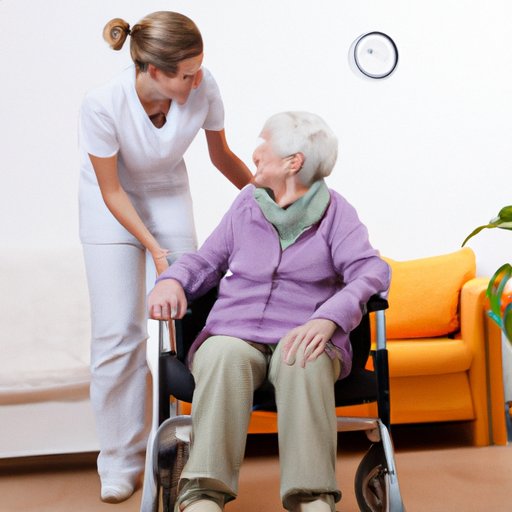Introduction
A home health agency is an organization that provides medical and non-medical services to individuals in their own homes. Home health agencies are typically staffed by nurses, therapists, and home health aides who can provide a variety of services, from wound care to physical therapy to assistance with daily activities. These services can be beneficial for seniors, those with chronic illnesses, and other individuals who need care.
Exploring the Benefits of Home Health Care for Seniors
Home health care can be a great option for seniors who may not be able to get the care they need in a traditional setting. Here are some of the benefits of home health care for seniors:
Increased Independence
One of the biggest advantages of home health care for seniors is that it allows them to remain independent for longer. With the help of a home health aide, seniors can continue to live in their own homes and manage their day-to-day activities without the need for additional assistance. This increased independence can be invaluable for seniors who want to maintain their autonomy.
Improved Quality of Life
Another benefit of home health care for seniors is that it can improve their overall quality of life. Home health aides can assist with daily tasks like grocery shopping, meal preparation, and light housekeeping, which can make life easier and more enjoyable for seniors. Additionally, home health aides can provide companionship and emotional support, which can be especially beneficial for seniors who may be isolated or lonely.
Lower Cost of Care
Finally, home health care can be much more cost effective than other types of care. For example, nursing homes and assisted living facilities can be quite expensive, whereas home health care can be customized to fit the individual’s needs and budget. Additionally, home health care can be more convenient for families as they won’t have to worry about transportation or visiting hours.

How Home Health Agencies Help Patients Manage Chronic Illness
Home health agencies can be particularly helpful for those who are managing a chronic illness. Home health aides can provide a variety of services to help patients manage their conditions, including:
Coordinating Care
Home health aides can coordinate care with other healthcare providers, such as doctors, nurses, and specialists. This ensures that all of the patient’s care needs are being met and that there is consistency across providers.
Providing Education and Support
Home health aides can also provide education and support to patients and their families. They can provide information about the patient’s condition and how to manage it, as well as resources for additional support. Additionally, home health aides can provide emotional support to help the patient and their family cope with the diagnosis.
Monitoring Progress
Finally, home health aides can monitor the patient’s progress over time. They can track changes in the patient’s condition and provide feedback to the healthcare team. This can be invaluable for those who are managing a chronic illness and need close monitoring.

Comparing Home Health Care to Skilled Nursing Facilities
When considering care options, it’s important to compare home health care to skilled nursing facilities. Here are some key differences between the two:
Level of Care
Skilled nursing facilities provide 24-hour care and access to medical professionals, while home health care typically provides less intensive care. Home health care is best suited for those who only need occasional or intermittent care. Those who need more intensive care may be better served by a skilled nursing facility.
Cost
The cost of home health care and skilled nursing facilities can vary significantly, depending on the services needed and the location. Generally speaking, home health care is less expensive than a skilled nursing facility, but this can vary based on individual needs.
Location
Finally, home health care is typically provided in the patient’s own home, while skilled nursing facilities are located in a centralized facility. This can be beneficial for those who prefer to receive care in their own homes, as it can provide more flexibility and convenience.

The Role of Home Health Aides in Patient Care
Home health aides play an important role in providing patient care. They can provide a variety of services, including:
Assisting with Daily Activities
Home health aides can assist with a variety of daily activities, such as bathing, dressing, and grooming. They can also provide assistance with meal preparation, medication management, and light housekeeping.
Monitoring Vital Signs
Home health aides can also monitor vital signs, such as blood pressure and temperature. This can be especially helpful for those who are managing a chronic illness or recovering from an illness or injury.
Providing Companionship
Finally, home health aides can provide companionship to patients. This can be especially beneficial for those who may be isolated or lonely. Home health aides can provide conversation and emotional support, which can be invaluable for those who need it.
Conclusion
Home health agencies provide essential services for seniors, those with chronic illnesses, and other individuals who need care. Home health care can be beneficial for those who need assistance with daily activities, those who need assistance managing a chronic illness, and those who prefer to receive care in their own homes. Home health aides can provide a variety of services, from assisting with daily activities to providing companionship. For those who are considering home health care, it’s important to understand the services offered by home health agencies and the benefits of home health care.
(Note: Is this article not meeting your expectations? Do you have knowledge or insights to share? Unlock new opportunities and expand your reach by joining our authors team. Click Registration to join us and share your expertise with our readers.)
